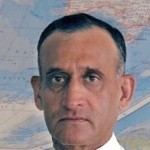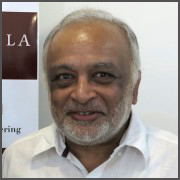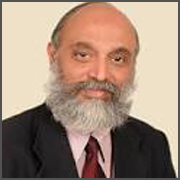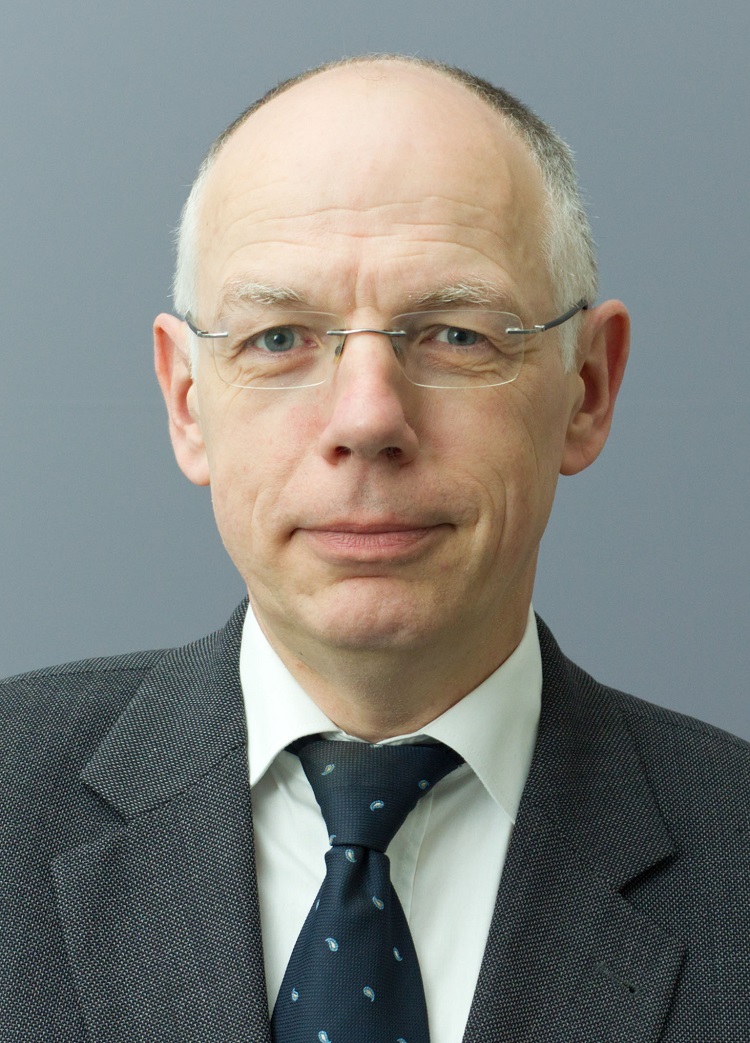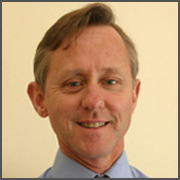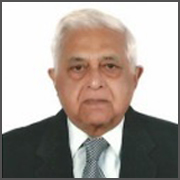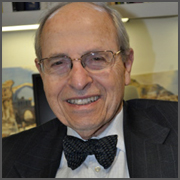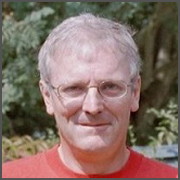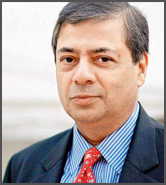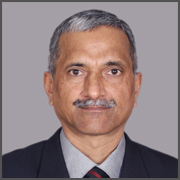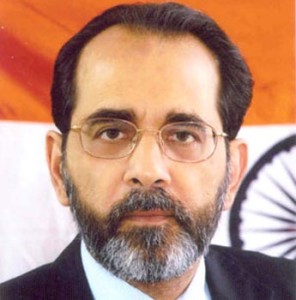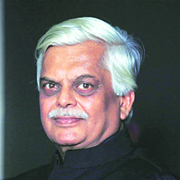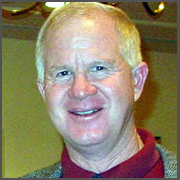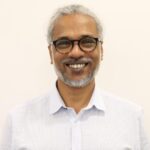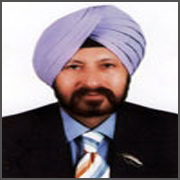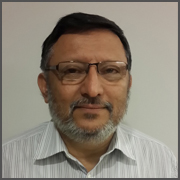–
Advisers / Friends
Mantraya’s diverse group of advisers and friends include:
–
Arun Prakash
Admiral Arun Prakash retired as India’s 20th naval Chief and Chairman Chiefs of Staff Committee in end-2006. A naval-aviator by specialization, he commanded a fighter squadron and four ships including the carrier Viraat. In flag rank, he commanded the Eastern Fleet, the National Defence Academy, the Andaman & Nicobar Joint Command and the Western Naval Command. He headed the Aviation and Personnel branches of the navy and was Vice-Chief before taking over as Chief of the Naval Staff in 2004. He was a member of the 2001 Arun Singh Task Force as well as the 2011 Naresh Chandra Committee on National Security Reform. Post-retirement he served two terms on the National Security Advisory Board and was Chairman of the National Maritime Foundation. He lives in Goa and writes and speaks on maritime and strategic issues.
Anand Arni
Mr Anand Arni was a career intelligence officer who served in the Research & Analysis Wing, India’s external intelligence, for 37 years, retiring in 2012 as the number two. In the R&AW, he spent over 25 years dealing with issues related to Pakistan and Afghanistan. He has also dealt with counter-insurgency in India’s Northeast and was a part of the team sent to Kandahar to negotiate with the hostage-takers of IC 814 in December 1999. Post-retirement, he continues to focus on India’s western neighbours. He writes, lectures and participates in conferences and track II initiatives on India’s ties with countries in this area.
C Uday Bhaskar
Commodore C Uday Bhaskar retired from the Indian Navy after 37 years of service in 2007. He was the Director of the National Maritime Foundation. He was also associated with the Institute for Defence Studies and Analyses (IDSA) from 1990 where he served as the Deputy Director (1996-2004) and later headed the Institute till late 2005. Subsequently, he was appointed Member-Secretary of the Government of India Task Force on ‘Global Strategic Developments’. Cmde Bhaskar is Editor, Maritime Affairs; and is on the Editorial Board of Contemporary Security Policy. He has edited books on nuclear and international security related issues and has contributed over 60 research articles to journals in India and abroad. He is a guest lecturer at the Indian National Defence College and other military colleges. He is a Life Member of the United Service Institute (USI) and is also Chairman of the Middle East Institute, New Delhi. He is on the Governing Council of the Indian Council of World Affairs (ICWA) and the Research and Information System for Developing Countries (RIS), as also on the Advisory Panel of the India Habitat Centre (IHC) in New Delhi. Cmde Bhaskar is also a columnist for Reuters and the Dainik Jagran.
Christian Wagner
Dr Christian Wagner is Senior Fellow at the German Institute for International and Security Affairs (SWP) in Berlin. He obtained his M.A. and PhD from Albert-Ludwigs-University Freiburg. From 1996 to 2001, he was an Assistant Professor at the Institute of Political Science and Administrative Studies at Rostock University. From 2001 to 2002, he was a Senior Fellow at the Institute for Development Research at the University of Bonn. He is a member of the European Association for South Asian Studies (EASAS) and the German Association for Asian Studies (DGA) where he was on the board of directors from 2007 to 2013.
From 2007 to 2014, he was head of the Research Division Asia at SWP. In 2015/16, he was a Visiting Fellow at the Observer Research Foundation (ORF), the Jawaharlal Nehru Institute for Advanced Studies (JNIAS) and the Institute for Defence Studies and Analyses (IDSA) in New Delhi. In 2019, he was Visiting Fellow at the Institute of South Asian Studies (ISAS) at the National University of Singapore (NUS). His main areas of interest are India, South Asia, and the Indo-Pacific with a special focus on domestic developments, foreign policy and security issues.
Christopher Langton
Christopher Langton spent 32 years in the British Army serving in a number of areas of the world. He was deputy head of the UN Observer Mission in Georgia (UNOMIG) in the mid-1990s and subsequently held a series of defence and military attache posts in Russia, the South Caucasus and Central Asia until he left the Army in 2001. He then joined the International Institute for Strategic Studies (IISS). He spent 9 years at IISS as Head of Defence Analysis, Research Fellow for Russia and the CIS and Senior Fellow for Conflict. While at IISS he was the focus of their research on Afghanistan. Since 2010 Christopher has run his own small not-for-profit group, Independent Conflict Research & Analysis (ICRA). Amongst other activities, ICRA produces a quarterly journal on trends in Central Asia and Afghanistan’s neighbourhood. ICRA also runs Conflict Analysis Training programmes for groups involved with conflict management and resolution.
Eric Gonsalves
Ambassador (retd) Eric Gonsalves joined the Indian Foreign Service in 1950 and served in various capacities including Counsellor, London; Deputy Chief of Mission, Washington; Ambassador to Japan and the European Union; Secretary, Ministry of External Affairs (Vice Minister). After retirement, he served as Director India International Centre, Delhi 1986-91 and was Director Asian Relations Commemorative Conference in 1987. Amb. Gonsalves was a member of the International Observer Group for the Sri Lanka Elections 1989-94, Member of the Board of Management MAHE (now Manipal University) 1994-2006, President of the Institute of Peace and Conflict Studies, New Delhi (till April 2008). Currently, he is a Member of the Governing Body of the Centre for Policy Research, Delhi and the Convenor of the Indian Delegation BCIM (Bangladesh China India Myanmar) Forum.
I P Khosla
Ambassador I P Khosla (retd) Educated at St. Stephens College, Delhi University. and Emmanuel College, Cambridge, I.P.Khosla joined the Indian Foreign Service in 1960. He has served in a number of neighbouring countries: as India’s Representative in Bhutan; High Commissioner to Bangladesh; Ambassador to Afghanistan as well as Secretary in the Ministry of External Affairs. After retirement from service in 1996 he has written extensively on India’s relations with neighbours, South Asian cooperation as well as on security issues. He is currently Member Secretary of the Indian Council for South Asian Cooperation and Editor in Chief of South Asian Survey, the biannual journal of the Council.
Marvin G. Weinbaum
Prof. Marvin G. Weinbaum is professor emeritus of political science at the University of Illinois at Urbana-Champaign, and served as analyst for Pakistan and Afghanistan in the U.S. Department of State’s Bureau of Intelligence and Research from 1999 to 2003. He is currently a scholar-in-residence and Director of the Pakistan Center at the Middle East Institute in Washington DC. Professor Weinbaum has his doctorate from Columbia University in 1965, his MA from the University of Michigan in 1958, and his BA from Brooklyn College in 1957. In 1965 he joined the faculty of the University of Illinois at Urbana-Champaign. At Illinois, Dr. Weinbaum served for fifteen years as the director of the Program in South Asian and Middle Eastern Studies.
Paul B. Rich
Dr Paul B Rich is the editor of the journal Small Wars and Insurgencies and currently lives in the UK. He has taught at the universities of Bristol, Warwick and Melbourne and is the author of a number of books and articles on insurgencies, terrorism and warlordism. He has also written extensively on politics and history in South Africa and is currently completing a book Cinema and Guerrilla Warfare. As a consultant for TRENDS: Research & Advisory he is co-editing a volume Jihadist Insurgencies, which is to be published by Routledge in 2016.
Pranay Gupte
Pranay Gupte is an established biographer and historian, and veteran foreign correspondent. He is also a blogger for The Huffington Post, and an occasional columnist for such publications as The Hindu. He previously worked for nearly two decades for The New York Times in the United States, Africa, the Middle East, and Asia. He also wrote a column for Newsweek International for two decades, and was a contributing editor at Forbes. Mr. Gupte, who lives between Dubai and Delhi, has produced more than 50 documentaries for public television in the US. His hobby is photographing people around the world.
Rahul K Bhonsle
Rahul K Bhonsle is an army veteran with over three decades active service. He is an independent consultant on research in defence and security issues in Asia and Director Security Risks Asia, an Asian Risk and Knowledge Management consultancy based in Delhi.
Rakesh Sood
Rakesh Sood joined the diplomatic service in 1976 and served in the Indian missions in Brussels, Dakar, Geneva, and Islamabad in different capacities and also as Deputy Chief of Mission in Washington. In Delhi, Ambassador Sood served as Director (Disarmament) and set up the Disarmament and International Security Affairs Division which he led for eight years till end of 2000 as Joint Secretary (D&ISA), in the Foreign Ministry. During this period, he was responsible for multilateral disarmament negotiations, bilateral dialogues on CBMs with Pakistan, strategic dialogues with other countries especially after the nuclear tests in 1998, and India’s role in the ARF.
Subsequently, he has served as Ambassador and PR to the Conference on Disarmament in Geneva (2001-04), Ambassador to Afghanistan (2005-08), Ambassador to Nepal (2008-11) and Ambassador to France (2011-13). In September 2013, Ambassador Rakesh Sood was appointed Special Envoy of the Prime Minister for Disarmament and Non-Proliferation Issues; he held this position till May 2014, when he retired from government.
Sanjaya Baru
Dr Sanjaya Baru is Director for Geo-economics and Strategy, International Institute of Strategic Studies (IISS), London; and, Honorary Senior Fellow, Centre for Policy Research, New Delhi. He was Media Advisor to Prime Minister of India, Dr Manmohan Singh and also Prime Minister’s spokesperson and principal speechwriter, between 2004 and 2009. He has been Chief Editor, The Financial Express and Business Standard; and Associate Editor, The Times of India and The Economic Times. In 2009 he was a Visiting Professor at the Lee Kuan Yew School of Public Policy and Institute of South Asian Studies, Singapore. He has Professor, Indian Council for Research in International Economic Relations (1999-2000) and at the Departments of Economics of Jawaharlal Nehru University (1985-86) and University of Hyderabad (1979-1990). Between 1999 and 2001 Dr Baru was Member of the National Security Advisory Board of India, and in 2011-12 he was Member of the India-ASEAN Eminent Persons Group. He is Founder-Trustee, Forum for National Security Studies & Centre for Air Power Studies, Delhi; Member, Governing Board, Centre for Policy Research & India Habitat Centre; Member, Advisory Council, India International Centre; and Member National Executive Committee of the Federation of Indian Chambers of Commerce & Industry (FICCI). Dr Baru’s publications include Strategic Consequences of India’s Economic Performance (Routledge, 2006), The Political Economy of Indian Sugar (Oxford University Press, 1990) and several essays in journals and newspapers in India and abroad. His most recent book is The Accidental Prime Minister: The Making and Unmaking of Manmohan Singh, Penguin Random House, 2014.
Thomas Marks
Prof. Thomas A. Marks is a Distinguished Professor of Insurgency, Terrorism, and Counterterrorism at the School for National Security Executive Education (SNSEE) of National Defense University (NDU) in Washington, DC and the author of Maoist Insurgency Since Vietnam (London, 1996), considered the current standard on the subject of “people’s war.” A former US government official who is a member of the editorial board of Small Wars and Insurgencies (London), he previously served as the Oppenheimer Chair of Warfighting Strategy at the Marine Corps University (Quantico), where he taught “Insurgency and Operational Art.” He is an Adjunct Professor at the US Joint Special Operations University (JSOU, Hurlburt Field, FL) and a consultant for several firms specializing in political risk, personal security, and counter-terrorism, including RAND, where he is a member of the Insurgency Board. He graduated from the United States Military Academy and in his PhD work at the University of Hawaii focused on the relationship between popular upheaval and revolutionary crisis (published as Making Revolution: The Insurgency of the Communist Party of Thailand in Structural Perspective, Bangkok: White Lotus). In recent years, Dr. Marks has, in a variety of publications, for a variety of clients, analyzed conflicts as far-flung as those in Nepal, Sri Lanka, Colombia, Peru, Papua New Guinea, Laos, and the Philippines, and Northern Ireland. His most recent operational endeavour was service, in a contract capacity, as the operations consultant for a newly raised Saudi Arabian commando unit. His scholarly and journalistic works number in the hundreds. His latest book is Counter-Revolution in China: Wang Sheng and the Kuomintang (London: Frank Cass, 1997); his latest monographs, all published by the U.S. Army War College (Carlisle), are Colombian Army Adaptation to FARC Insurgency (2002), Insurgency in Nepal (2003), and Sustainability of Colombian Military/Strategic Support for “Democratic Security” (2005).
V. Krishnappa
Professor Krishnappa is a philosopher and the Head of the Philosophy Programme at the School of Liberal Arts and Sciences (SoLAS), RV University Bengaluru. He is also the Director of RVU’s Mahatma Gandhi Centre for Contemporary Ethics (MGCCE). Krishnappa’s teaching and research interests include Ancient Greek Philosophy, Continental Philosophy, the work of Ludwig Wittgenstein, Tolstoy, philosophical and literary reading, philosophy and the liberal arts education, pedagogy, and critical thinking.
Prior to joining RVU Krishnappa was a Doctoral Research Fellow at O.P. Jindal Global University in the area of Philosophy and Literature (2015-21). Krishnappa holds a PGDip in Strategy and Innovation from the Saïd Business School (SBS), University of Oxford, and an MSc in Defence and Strategic Studies from the University of Madras. He also earned a certificate in Business Management from the Indian Institute of Management, Ahmedabad (IIM-A, 2013-14) and a Certificate in Peace Research from the University of Oslo, Norway (2008). He is also a graduate of Defence Services Staff College (Wellington,2001-02) the SEAS programme (USIEF, Hawai, 2008), College of Air Warfare (Secunderabad, 1995), and the Air Force Administrative College (Coimbatore, 1994), Pre Flying Training College (1988), Basic Flying Training School (1989), Air Force Academy, (1990).
Krishnappa has over 30 years of experience with 18 years in teaching and research. Krishnappa was a Research Fellow at the Institute for Defence Studies and Analyses (IDSA) between 2004 and 2013. He has a number of publications to his credit in peer-reviewed journals, book chapters and five edited volumes in the fields of national strategy, international relations and security studies. During his Fellowship at IDSA, Krishnappa led many large international and interdisciplinary projects including the IDSA- DRDO Strategic Futures 2050 project commissioned by the Government of India, and a project with the Norwegian Institute for Defence Studies (IFS) on India’s Grand Strategy: History, Theory, Cases.. Previously, he served in the Indian Air Force (IAF) on active duty between 1986 and 2004 holding various operational and management positions, retiring after attaining the rank of Group Captain (Select).
Previous Advisers
Late Gurmeet Kanwal
Prior to his unfortunate demise on 16 March 2020, Brigadier (retd) Gurmeet Kanwal was an adjunct fellow with the Wadhwani Chair at the Centre for Strategic and International Studies (CSIS) in Washington, D.C. He was director of the Centre for Land Warfare Studies (CLAWS) in New Delhi (January 2008–March 2012). Brig. Kanwal commanded an infantry brigade in the high-altitude Gurez Sector in northern Kashmir on the Line of Control with Pakistan (Operation Parakram, 2001–2003) and an artillery regiment in counterinsurgency operations in the Kashmir Valley (Operation Rakshak, 1993–1994). He served as deputy assistant chief of integrated defence staff (doctrine, organization, and training) at HQ Integrated Defence Staff, New Delhi; director MO-5 in the Directorate General of Military Operations at Army Headquarters (dealing with the threat, strategy, and force structure); UN military observer in UNTAG, Namibia; brigade major of an infantry brigade and instructor-in-gunnery at the School of Artillery, Devlali. After opting for voluntary retirement in 2003, Brig. Kanwal joined the Observer Research Foundation (ORF) in New Delhi as a director of security studies and senior fellow. He has also served as a senior fellow at the Institute for Defence Studies and Analyses (IDSA) in New Delhi; a senior fellow at the Centre for Air Power Studies in New Delhi; and visiting research scholar at the Cooperative Monitoring Centre (CMC), Sandia National Laboratories in Albuquerque. Brig. Kanwal authored several books, including Nuclear Defence: Shaping the Arsenal; Indian Army: Vision 2020; Pakistan’s Proxy War; Heroes of Kargil; Kargil ’99: Blood, Guts and Firepower; and Artillery: Honour and Glory. He contributed extensively to various journals of repute, as well as leading national newspapers, and he wrote a column on national security for the Statesman.
Late Shakti Sinha
Prior to his unfortunate demise on 4 October 2021, Shakti Sinha was the part-time Director of South Asian Institute for Strategic Affairs, a virtual think tank that is in the process of being established. He wrote and spoke on governance, political economy, strategic affairs and Afghanistan. He joined the Indian Administrative Service in 1979 and took voluntary retirement in Oct 2013 when he was with the Government of National Capital Territory of Delhi as Principal Secretary (Finance, Power & Planning). Before joining Delhi Govt. in May 2012, he was Chief Secretary, Andaman & Nicobar Administration. He worked with the UN Mission in Afghanistan for three years coordinating international support to the Government on National Development Strategy, and on sub-national governance. He spent about two years with think tanks in Delhi (Observer Research Foundation) and Singapore (Institute of South Asian Studies) working on various development issues and Afghanistan respectively. Author of a number of chapters and papers on the Afghan situation including for international publications plus various articles for newspapers and journals on Governance, Political Economy of Reforms and on the Chinese economy.
